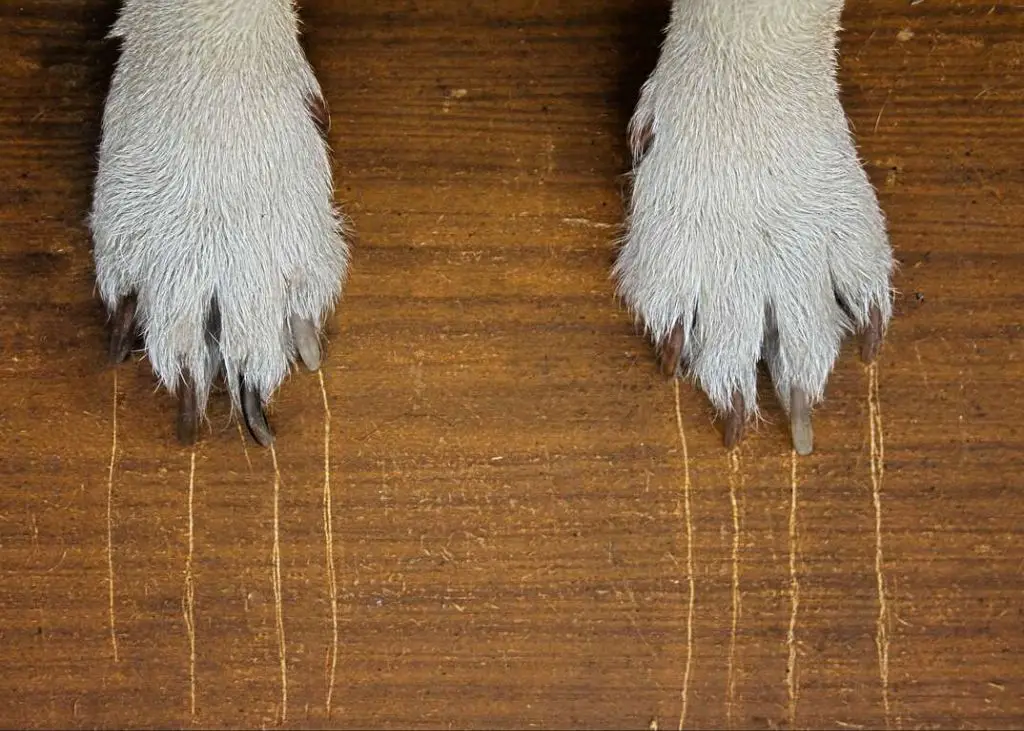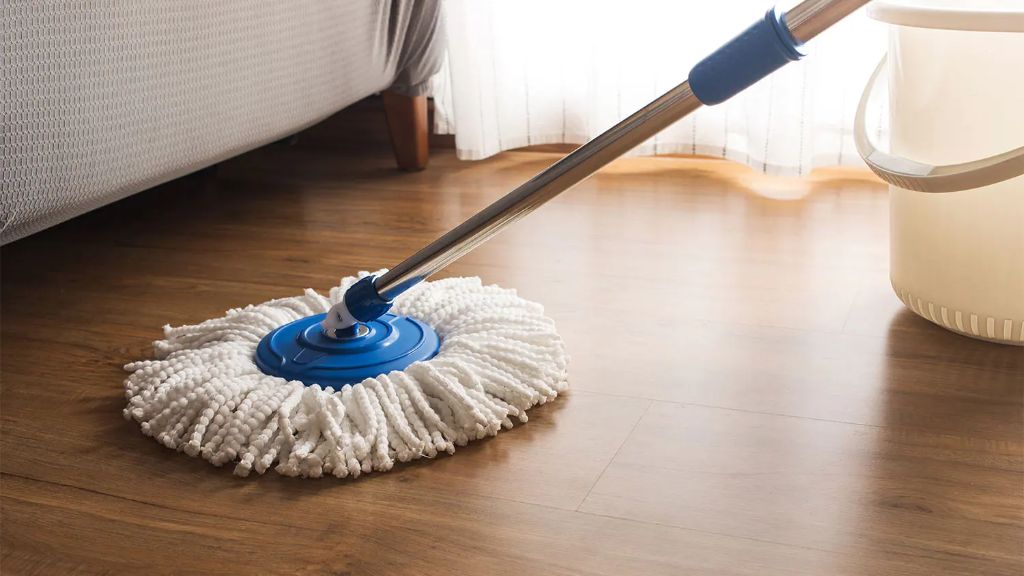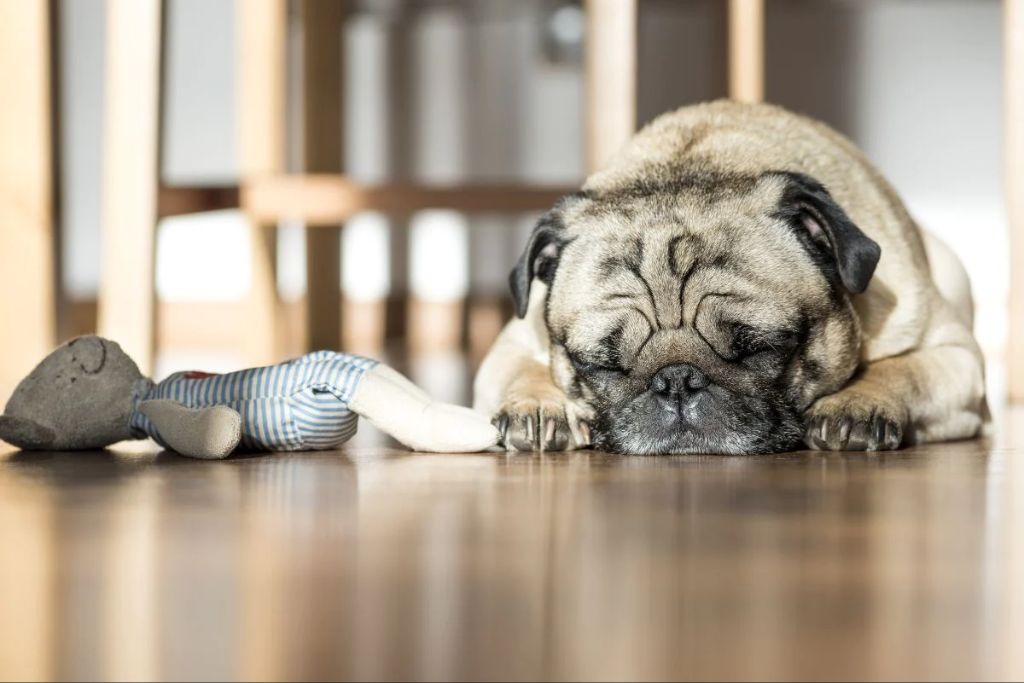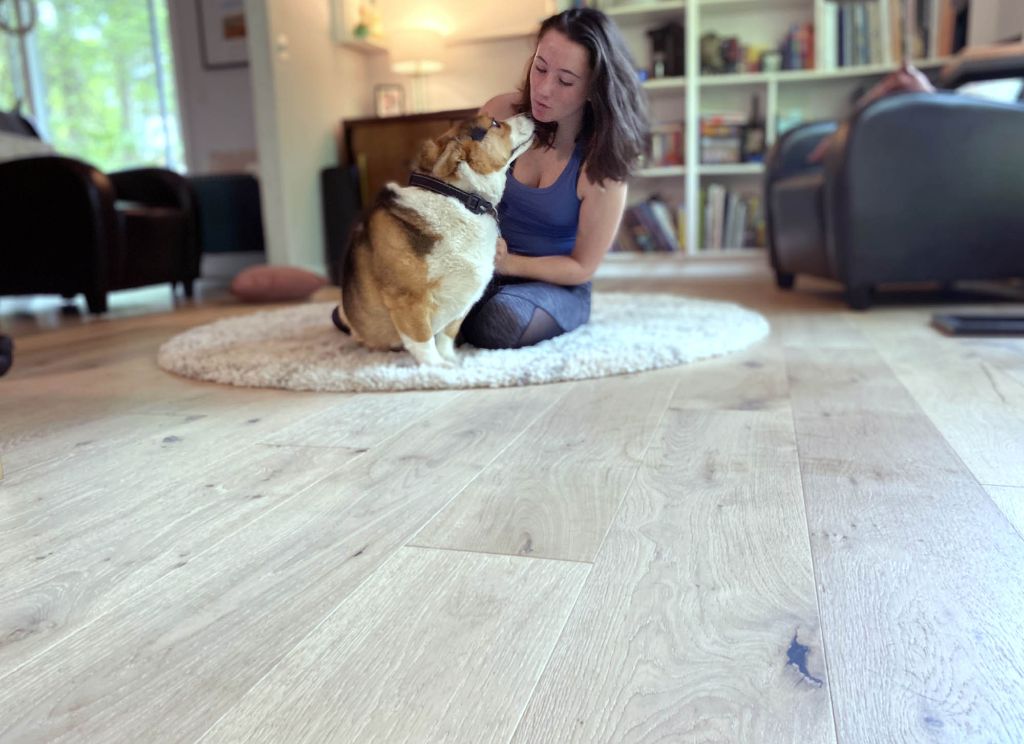Introduction
Engineered hardwood and luxury vinyl plank (LVP) are two popular flooring options for homes with dogs. Engineered hardwood consists of real wood veneers adhered to plywood cores, making it more stable than solid hardwood. LVP features a photographic layer on top mimicking wood or stone, with a rigid composite core below. Both provide the look of natural materials in durable, pet-friendly flooring.
LVP offers exceptional scratch, dent and moisture resistance due to its resilient surface. Engineered hardwood still shows some dings and swells if moisture leaks underneath. But it provides a seamless authentic wood look, while LVP offers more diverse patterns and stone designs. With proper maintenance like quick cleanup of spills and accidents, both floors hold up well to dogs’ claws and heavy use.
This guide examines the durability, maintenance, cost, styles and other factors to consider when choosing between engineered hardwood and LVP flooring for homes with dogs.
Durability
When it comes to durability and scratch resistance, there are some key differences between engineered hardwood and luxury vinyl plank (LVP) flooring. Engineered hardwood is made with a plywood or real wood base coated with a thin veneer of hardwood on top. This construction makes it resistant to dents that vinyl can be prone to (1). However, the hardwood surface is more susceptible to scratches and gouges over time, especially from pets. LVP has a PVC vinyl surface layer that is designed to be highly scratch-resistant (2). The vinyl surface protects the rigid composite core, making LVP extremely durable for busy homes with kids and pets.

Overall, LVP tends to hold up better against scratches from pet nails and high traffic areas. The vinyl surface is tough and doesn’t show light scratches easily. Engineered hardwood can be refinished to remove deeper scratches, but the process is time-consuming and costly compared to simply replacing a damaged LVP plank (3). When evaluating scratch resistance, LVP comes out ahead for active households.
Water Resistance
One of the key differences between engineered hardwood and LVP is their ability to withstand moisture exposure. LVP offers superior water resistance compared to engineered hardwood.
LVP is highly water-resistant and most products are 100% waterproof thanks to the vinyl protective layer. This makes LVP an excellent choice for kitchens, bathrooms, basements, and other areas prone to spills or moisture [1]. In contrast, engineered hardwood is more vulnerable to water damage and swelling. The veneer layer can warp or peel away when exposed to excessive moisture.
While engineered hardwood flooring has some resistance to moisture due to the plywood base, it cannot withstand standing water or frequent exposure like LVP. The planks may cup or buckle if continually saturated [2]. Proper moisture barriers, ventilation, and prompt drying are needed when installing engineered wood in wet areas.
For homeowners concerned about water damage or leaks, LVP is the safer, more water-resistant choice over engineered hardwood. Its vinyl protective coating offers complete waterproofing not found with wood floors.
Ease of Cleaning
When it comes to cleaning up after pets, LVP has a clear advantage over engineered hardwood. LVP is highly water-resistant, so liquids like urine can be easily wiped up without being absorbed into the flooring (1). Engineered hardwood, on the other hand, is not waterproof. Liquids can damage the wood and lead to warping if not cleaned up immediately (2).
With LVP, messes can simply be wiped up with a damp mop or cloth. Engineered hardwood requires more careful cleaning with specialty hardwood floor cleaners to avoid damaging the finish (3). Scrubbing too aggressively can ruin the protective layer of varnish or urethane on engineered wood.

Pet accidents and tracked-in dirt are inevitable with four-legged family members. LVP’s resilience and low maintenance make it the easier flooring to keep clean day-to-day with dogs. Engineered hardwood requires more meticulous care and caution to avoid permanent damage from moisture.
Comfort Underfoot
When choosing flooring for dogs, an important consideration is the softness and warmth the material provides underfoot. Dogs spend a lot of time lying down, so comfort is key.
Engineered hardwood is not as soft or warm for dogs compared to vinyl plank flooring. The hard surface of engineered hardwood can be uncomfortable for dogs to lie on for long periods. Vinyl planks provide more cushioning and warmth. The vinyl material and attached underlayment make it softer under paws.
According to https://floorauthority.com/blogs/tips/best-flooring-for-dogs, luxury vinyl plank (LVP) flooring provides more comfort for dogs than hard surfaces like engineered hardwood. Thefoam underlayment included in LVP makes it softer and warmer underfoot.
In summary, LVP offers better comfort for dogs than engineered hardwood in terms of softness and warmth. The vinyl material and underlayment provide more cushioning that is easier on dog joints and paws during long periods of lying down.

Noise Reduction
Both engineered hardwood and luxury vinyl plank (LVP) flooring can help dampen noise from dogs, but LVP tends to perform better for sound absorption overall. LVP is constructed with a dense core and attached underlayment that provides noise-reducing qualities. According to Parterre Flooring, LVP flooring is specially designed to reduce noise and is a popular choice for acoustic flooring. LVP floors with attached underlayment and a rigid core rated for IIC (impact insulation class) and STC (sound transmission class) values will offer the best noise reduction.
Engineered hardwood can also dampen noise more than solid hardwood when installed with a sound-absorbing underlayment, according to Twenty & Oak. The layered construction of engineered wood allows it to reduce noise transmission slightly better than solid hardwood. However, LVP still tends to outperform engineered hardwood for noise reduction from pets. An additional acoustic underlayment beneath engineered hardwood can help improve sound absorption.
Cost Comparison
When it comes to installation and material costs, engineered hardwood and LVP differ significantly. According to Robbins, LVP flooring typically costs between $2.50 and $5 per square foot for materials. Engineered hardwood can cost $6-12 per square foot. For installation, LVP runs $3-5 per square foot while engineered hardwood installation averages $6-10 per square foot.
Overall, LVP is the more budget-friendly option. A Reddit user compared installed costs for hickory engineered hardwood ($9 per square foot) and LVP ($3.50-$5 per square foot) and found LVP to be considerably cheaper (source). While engineered hardwood carries a premium price, it may add more value to a home in the long run.
Style Options
When it comes to available colors and patterns, LVP and engineered hardwood offer different aesthetic options. LVP comes in a wide variety of wood looks, stone and tile visuals, and abstract patterns that resemble materials like marble or travertine. There are hundreds of different LVP products on the market with unique colors and designs. This allows for a high degree of customization and on-trend looks (Next Day Floors).
Engineered hardwood is limited to natural wood tones and grains but can mimic many different wood species like oak, hickory, maple, etc. The wood visual has an authentic, timeless appeal. However, engineered hardwood lacks the diversity of colors, patterns, and visuals that LVP provides. Homeowners looking for a modern, trendy aesthetic with unlimited options will likely prefer LVP over engineered hardwood (Robbins).
Environmental Impact
When it comes to environmental impact, engineered hardwood is generally considered a more sustainable option than LVP.
Engineered hardwood is made from real wood layered over a plywood or high-density fiber core. The top layer is solid hardwood, while the core layers use material that may otherwise go to waste (Environmental Benefits of Engineered Wood Flooring). Engineered hardwood is also naturally biodegradable at the end of its lifespan.
LVP flooring, on the other hand, is made primarily from PVC resin and limestone. PVC is derived from fossil fuels and is not biodegradable. The production of PVC also creates harmful byproducts (LVP vs Engineered Hardwood Flooring Comparison Guide).
When properly managed, timber used for engineered hardwood can come from sustainable sources. So in terms of sustainability, engineered hardwood has some advantages over LVP flooring.

Conclusion
When choosing between engineered hardwood and LVP for a home with dogs, there are several key factors to consider. LVP tends to be more durable and water resistant than hardwood. It’s also easier to clean and maintain. Hardwood offers a bit more comfort underfoot and style options. However, LVP has improved significantly in visual appeal over the years.
Overall, LVP is generally the better option for dog owners due to its scratch resistance, waterproof properties, and easy maintenance. Hardwood requires more careful cleaning and can show wear and damage over time. LVP provides a beautiful look that mimics hardwood, but with enhanced durability and longevity. The lower cost of LVP is also appealing. Just be sure to select a high-quality rigid core LVP for floors with dogs.
In summary, LVP is usually the best flooring choice for homes with dogs given its durability, water resistance, affordability, and realistic wood look. For dog owners wanting the beauty of hardwood with better resilience, LVP is a great option.